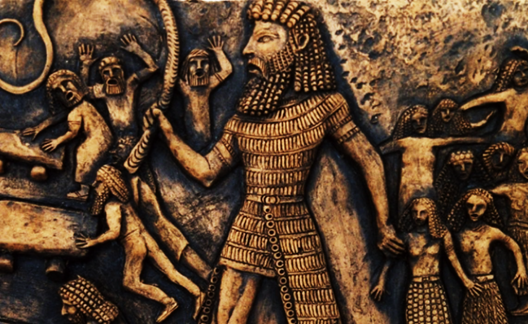In This World
I have a friend whose parents or grandparents were from Greece. My friend has visited my home several times. Every wall in the house is essentially an art gallery of photos I have taken on trips overseas. Many photos are from the Greek mainland, but most are taken on the islands.
In addition to photos, I have the golden funeral mask of Agamemnon, the King of Mycenae. There are real questions about whether or not it was Agamemnon’s funeral mask. Heinrich Schliemann, a German archaeologist, discovered the mask in 1876. Since then, it has been tied to Agamemnon. I wouldn’t bet that it was actually his funeral mask. However, the guy who sold me the mask at a backstreet café on Mykonos said it was pure gold and assured me it was Agamemnon’s.

I showed my friend a photo of King Leonidas that I took at Thermopylae. Leonidas’ 300 Spartans and about 1000 other Greeks held at bay the Persian force ranging from as few as 100,000 to nearly 500,000 commanded by Xerxes I.
Xerxes sent a messenger to Leonidas demanding surrender. Leonidas was not going to yield to the Persian invading army and replied, “Moλωυ λαβε” (molon labe). That surely caught Xerses off guard. My friend caught me off guard when he said he had that tattooed on his body.
In Greek, moλωυ λαβε is a Greek circumstantial participle that roughly translates “having come, take.” Our 21st-century translation is, “Come and get them.” The battlefield of Thermopylae was located between a mountain range and the sea, which was about the length of a football field, 100 yards. Greek strategy wasn’t to beat Xerses with an army of hundreds of thousands of soldiers. However, Leonidas merely was to delay Xerses\' army so that the Greek navy could destroy Xerses’ navy at the naval battle of Artemisium. That was precisely what occurred in 480 BCE.
However, this article is about Elysium, also known as the Elysian Fields. It was a Greek concept of the afterlife. Essentially, it was their version of what we call heaven and hell. Elysium was delineated from Hades. Mortals could be admitted to Elysium after they had crossed the River Styx, the river of death.
Homer said that Elysium was located on the western edge of the Earth near the river Okeanos. Essentially, it was paradise. If you were good during your life, your reward was Elysium.
There are many reasons why that Greek mindset seems counterintuitive, at least to me. There are two primary issues that I question that notion. The first is the idea of an afterlife. Now, most world religions have a similar idea. Do good, and you will be rewarded with heaven after you die. If you were bad, you would suffer in hell. It is the theological duality of good news/bad news.
Interestingly, the Greeks believed that hubris was the cardinal sin. False pride would surely be punished in the afterlife. Where did the Greeks and the other world religions get the notion of heaven and hell? Well, the answer depends upon the deity of any of the religions. If you were Shinto, all the other religions are wrong. If you were Christian, all the others were following the wrong religion.
There is no evidence that we have an afterlife other than the statement that life after death awaits us. I have created my 21st-century version of Pascal’s 17th-century divine wager. Campbell’s divine wager makes better sense than Pascal\'s or other religions.
“Do good in life by reaching out to others. If there is a God, that will please her. If God doesn’t exist, you have, at least, helped some people who were suffering for various reasons. They will be pleased and suffer less because of you.” Man, that is pretty clear. Pleasing God doesn’t seem necessary.
Your purpose in life is to create Elysium or Elysian Fields, which sounds a bit godly for humans to do. Be a creator of paradise.











